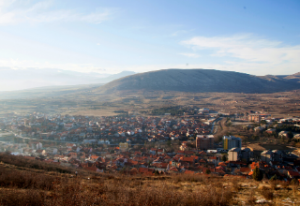The Recipe for Fake News: Maybe 80% True and 20% Fake
 The city of Veles in the center of North Macedonia has recently gained fame as a key base for the fake news industry. The city is home to dozens of website operators that disseminate false stories. Over the course of 2015, many of these actors realized that the American public was hungry for news about the presidential race between Hillary Clinton and Donald Trump, and saw this as a great opportunity to advance their business plans. At first the webpage operators disseminated fake news against both candidates, but they soon realized that the pages attacking Trump received relatively few likes and shares, whereas those supporting Trump and attacking Clinton proved to be a gold mine. “The average salary in Macedonia is around $400 a month, whereas an average webpage yielded around $1,200, and some of them raises over a million dollars over the course of the 2016 election year,” explain the researchers.
The city of Veles in the center of North Macedonia has recently gained fame as a key base for the fake news industry. The city is home to dozens of website operators that disseminate false stories. Over the course of 2015, many of these actors realized that the American public was hungry for news about the presidential race between Hillary Clinton and Donald Trump, and saw this as a great opportunity to advance their business plans. At first the webpage operators disseminated fake news against both candidates, but they soon realized that the pages attacking Trump received relatively few likes and shares, whereas those supporting Trump and attacking Clinton proved to be a gold mine. “The average salary in Macedonia is around $400 a month, whereas an average webpage yielded around $1,200, and some of them raises over a million dollars over the course of the 2016 election year,” explain the researchers.
As part of the study, which was led by Dr. Israel Waismel-Manor from the School of Political Science, research student Heather Hughes from the School traveled to Veles to interview those involved in disseminating fake news. She even joined a course where people learned how to make money through viral internet actions. “During classes, the students do not learn how to disseminate political fake news. The course provides them with tools that enable each of them to become a propaganda machine for any course, from promoting wonder cures to gossip websites and on to websites supporting or opposing any particular political candidate,” Dr. Waismel-Manor explained.
During the study, the researcher held several interviews with local residents who had worked in the fake news industry, and with young local people who were familiar with the website businesses. Most of the interviewees refused to allow their comments to be recorded, and accordingly the study is based on the notes taken by the researcher during the interviews. “After someone asked me during one interview to pay 5000 euros or to have sex in return for continuing the interviews, I decided to leave the city immediately and ended by fieldwork earlier than planned,” reveals researcher Heather Hughes.
The interviews with the fake news disseminators show that they have no ethical problem with the way they behave and no regrets on the issue. “We can’t afford anything, and if the Americans can’t tell the different between real news and fake news, that’s their problem.” Some of them added: “It’s the Americans’ fault that they don’t understand anything. What does it matter if we make money because they can’t tell the difference?”
The researcher asked the fake news disseminators what they think about the fact that they are committing illegal acts? They all replied that their actions were legal, but some of them laughed nervously and were clearly uncomfortable with the question.
Many of the workers in the fake news industry are single young men. They did not become millionaires, but they earned around $1000 a month – three or more times the average wage in Veles. “People need money in order to make money. It’s a circle everyone wants to be part of, but they can’t begin without 500 euros,” said one female interviewee who is saving money to sign up for a Facebook page building course.
One of the interviewees in the study was Mirko Ceselkoski, who ran the course in Veles on opening and publicizing Facebook pages. Ceselkoski has become a local sensation. He stands at the center of the fake news industry in town and over the years he has taught over one hundred local residents how to make money by promoting Facebook pages and tweets. As mentioned above, the researcher participated in the course and interviewed Ceselkoski: “Fake news creates a bigger buzz on the various social networks than in the mainstream news. The key to success is building trust with the site’s visitors. You have to maintain the page over a long period with credible information, and after the trust has been built you can start to disseminate fake news. The proportion is 80% accurate content and 20% falsehoods. When the fake news is wrapped up among true stories, it enhances the credibility of the source publishing the story and makes the reader read something that they would otherwise categorize as untrue.”
“The page promoters in Veles and Ceselkoski’s students understood the mechanism that is needed in order to reach a very large number of people. They look for information or sensational details that have some grounding in reality, and then add details that are sometimes true and sometimes not. For example, as part of her election campaign, the American pubic was aware that Hillary Trump supports abortions while Donald Trump opposes them. The fake news disseminators created sensational headlines claiming that the Pope – who, of course, opposes abortions – was supporting Donald Trump’s candidacy for president of the United States. As a result, Trump supporters shared information that, as we explained, was untrue,” Dr. Waismel-Manor commented.
Dr. Waismel-Manor added that “the 2016 elections in the United States aroused a high level of interest and powerful emotions. People were thirsty to read anything, any post or tweet about the campaign. In addition, the young operators quickly learned that this thirst comes mainly from the right-hand side of the political spectrum, so they adjusted their false messages accordingly. It is difficult to gauge what impact this content had, but even if it only influenced a few tens of thousands of Americans, this could have tipped the scales in key states.”
When Ceselkoski was asked whether Russian operators planted information with his students, he replied that all the publications were produced locally in North Macedonia. According to the researchers, Ceselkoski did not want to be seen as a Russian pawn. But the fact that there is no proof of any involvement by the Russian Internet Research Agency (IRA) does not rule out the possibility that they were involved behind the scenes, without the knowledge of the young North Macedonians.
“Most of the local operators emphasized that they had only a single goal: to make money, and lots of it. Since we are drawing close to another election in the United States, we need to remember that while the North Macedonians are the winners in this story, democracy pays the price,” the researchers conclude.



